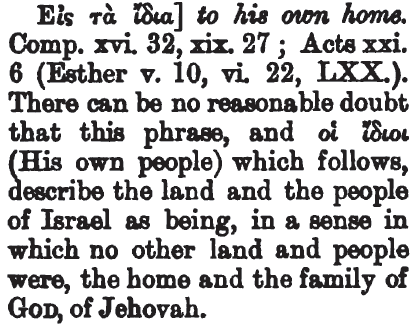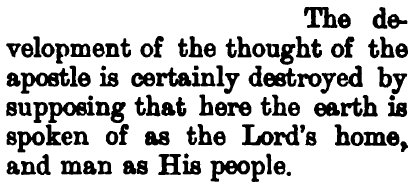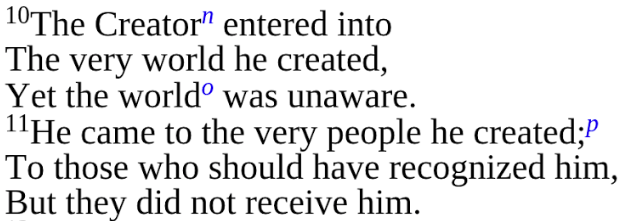I am presenting evidence that seems to suggest that the ‘Passion Translation’, so-called, is not in fact a translation from the original languages as it is represented to be. 1 Yesterday, I examined two of the translator’s footnotes to John 1.10 and today I continue with John 1.11 and its footnote.
John 1.11
11) εἰς τὰ ἴδια ἦλθεν, καὶ οἱ ἴδιοι αὐτὸν οὐ παρέλαβον. [NA 28]
(eis ta idia ēlthen, kai hoi idioi auton ou parelabon)
11 He came to His [a]own, and those who were His own did not receive Him.
Note 'a': John 1:11 Or own things, possessions, domain [NASB]
11 He came to His own[a] and His own[b] did not receive Him.
Note 'a': John 1.11 That is, His own things or domain
Note 'b': John 1.11 That is, His own people [NKJV]
11 He came to his own,[a] and his own people[b] did not receive him. Note 'a': John 1.11 Greek to his own things; that is, to his own domain, or to his own people Note 'b': John 1.11 People is implied in Greek [ESV]
It will be seen that many translations have footnotes to this verse. The point that they are all making, in different ways, is that τὰ ἴδια (ta idia) in the first clause is neuter, while οἱ ἴδιοι (hoi idioi) in the second clause is masculine. ἴδια and ἴδιοι are both forms of ἴδιος, ία, ον, meaning ‘one’s own’.
εἰς (‘into’, ‘to’) τὰ (‘the’) ἴδια (‘own things’) ἦλθεν (‘he came’)
thus means:
he came to his own things
Alternatively, τὰ ἴδια can refer to one’s home, as in John 19.27 for example: 2
εἶτα λέγει τῷ μαθητῇ· ἴδε ἡ μήτηρ σου. καὶ ἀπ’ ἐκείνης τῆς ὥρας ἔλαβεν ὁ μαθητὴς αὐτὴν εἰς τὰ ἴδια.
(eita legei tō mathētē; ide hē mētēr sou. kai ap’ ekeinēs tēs hōras elaben ho mathētēs autēn eis ta idia.)
Then He said to the disciple, "Behold your mother!" And from that hour that disciple took her to his own home. [NKJV]
The Revised Standard Version adopted this meaning in John 1.11:
He came to his own home, and his own people received him not. [RSV]
but the New Revised Standard Version relegated it to a footnote:
He came to what was his own,[a] and his own people did not accept him.
Note 'a': Or to his own home [NRSV]
The second clause:
καὶ (and) οἱ (the) ἴδιοι (own people) αὐτὸν (him) οὐ (not) παρέλαβον (received)
means:
and His own people did not receive Him.
In the Cambridge Greek Testament for Schools and Colleges, Alfred Plummer insisted that: 3
The difference between neuter and masculine must be preserved
Many (and probably most) commentators see a progression from the world in verse 10 to Israel in verse 11. Brooke Westcott, for example, understands τὰ ἴδια and οἱ ἴδιοι to refer to the land and people of Israel respectively: 4
The other interpretation mentioned by Westcott, that τὰ ἴδια refers to the earth, and οἱ ἴδιοι to all mankind, while he rejects it:
also shows a distinction being made between the two terms.
Simmons’ translation
Brian Simmons renders verses 10 and 11 as:
In verse 11 he makes no distinction between τὰ ἴδια and οἱ ἴδιοι, and he interprets both to be the ‘people he created’, making them presumably all the people of the earth, and closing off the possibility of recognising that verse 11 concerns Israel. He adds his own thought that these people ought to have recognised Him, but the holy scripture itself does not make this judgement. Bernard points out that whereas it is said in verse 10 that the world did not know Him, did not recognise Him: 5
this is not said of Israel in verse 11. They may have recognised Him, but they did not receive Him:
The possibility of making this further distinction is closed off in Simmons’ version, along with the distinction between Israel and the world.
Simmons’ footnote
Simmons’ footnote ‘p’ is connected to the first part of his version of verse 11:
and reads:
If he were translating from Greek, this alternative rendering:
to his own (things or people)
would have to relate to:
εἰς τὰ ἴδια
Forgive me, but I do not yet see how somebody who is translating from the Greek text could write such a footnote. τὰ ἴδια is neuter, it means ‘His own things’ or ‘His home’; it cannot mean ‘His own people’.
Andrew Chapman
Notes:
- For the record, I have previously presented it to author and publisher, but received no explanation for the errors and blunders in Greek and Hebrew contained in it. I also provided a statement from a named lecturer in Greek at a well-known ministerial training college, to the effect that he had seen my evidence, and had found that the ‘errors seriously erode my confidence in the integrity of the author’s claim to be producing the translation directly from Greek texts.’ ↩
- Also John 16.32. ↩
- The Gospel according to St. John, ed. A Plummer (Cambridge: University Press, 1913) p. 69. ↩
- B. F. Westcott, The Gospel according to St. John (London: Murray, 1908) p. 15. ↩
- J. H. Bernard, ‘A Critical and Exegetical Commentary on the Gospel of St. John, (New York: Scribner’s, 1929) p. 15. ↩






